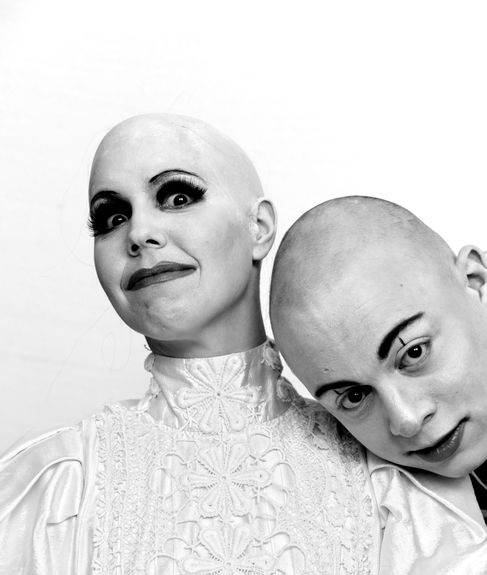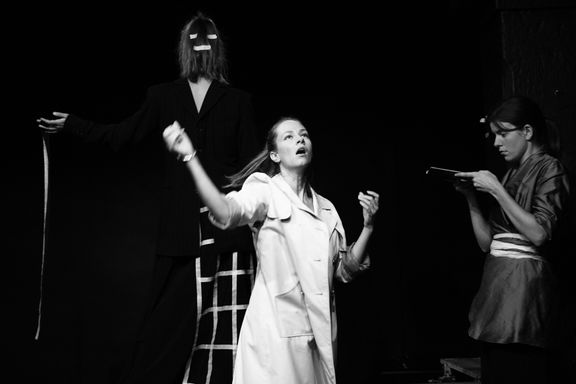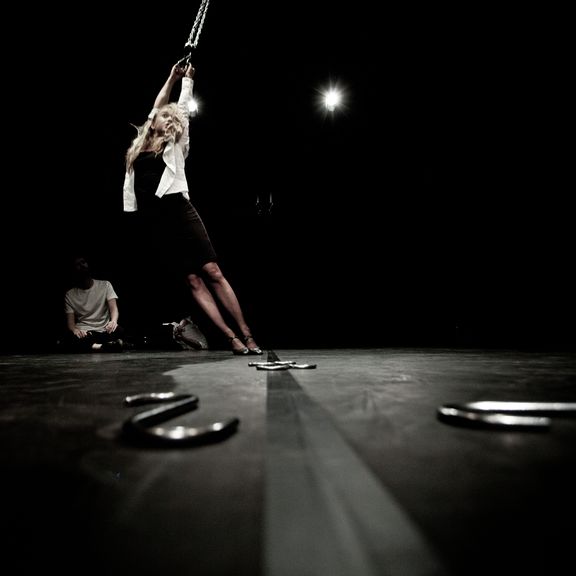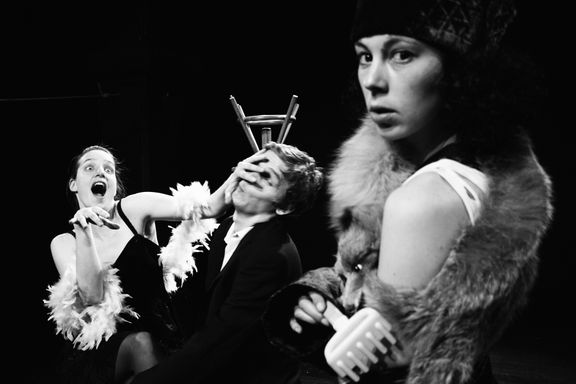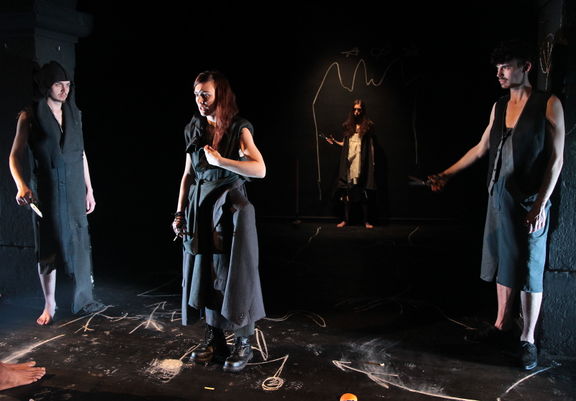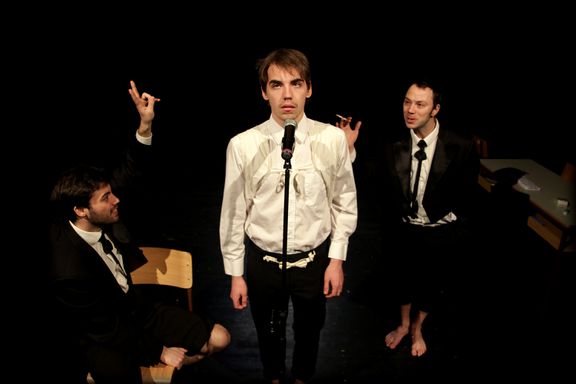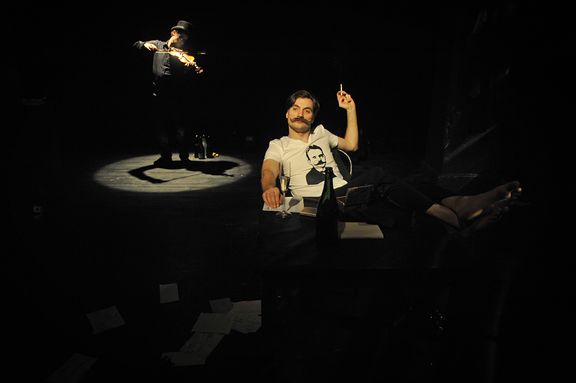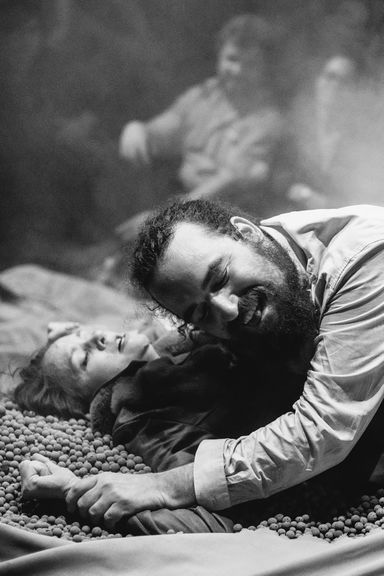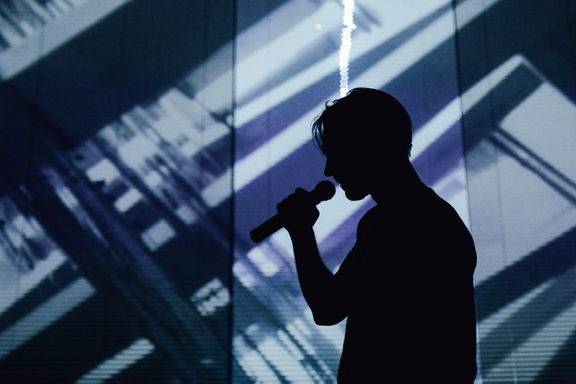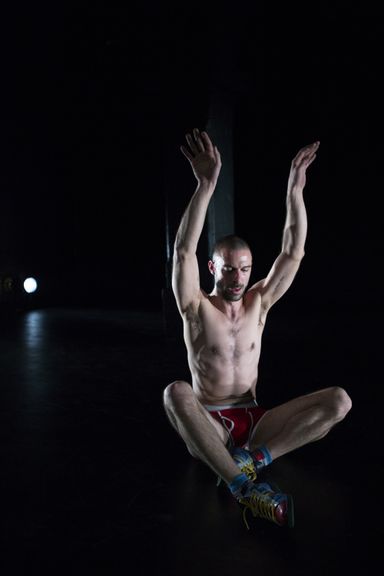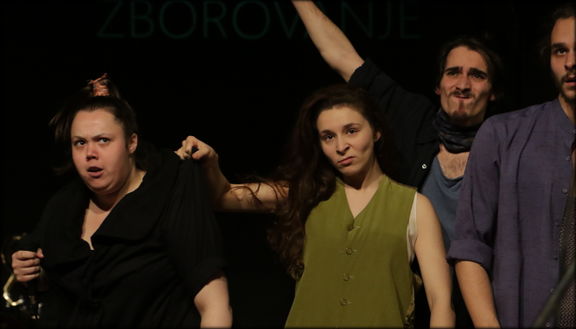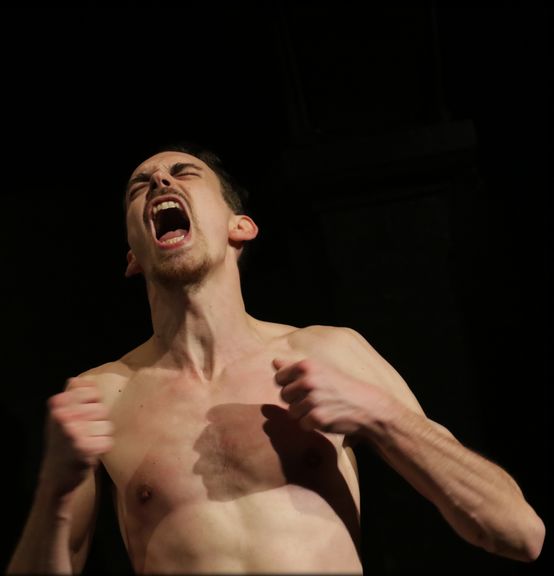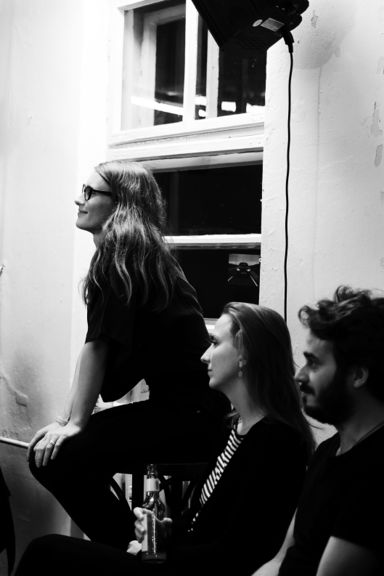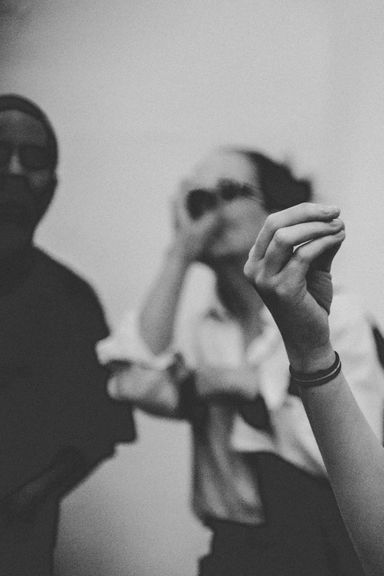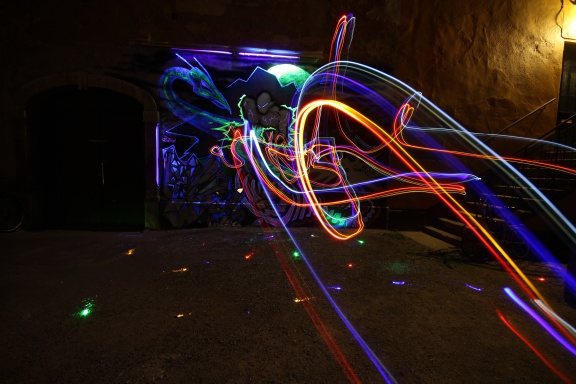Difference between revisions of "Glej Theatre"
| Line 43: | Line 43: | ||
{{Teaser| | {{Teaser| | ||
| − | {{Image|Glej Theatre | + | {{Image|Glej Theatre 2011 Mesnica Butcher Shop Photo Peter Giodani.jpg}} |
The oldest independent performing arts venue in Ljubljana, since its establishment as an experimental theatre in [[established::1970]], [[Glej Theatre]] has played an important role in the making of the Slovene theatre scene. It remains a place open to unorthodox approaches and theatrical research and focuses mainly on the upcoming generations of artists. [[Glej Theatre]] has profiled itself as an alternative theatre of different poetics and genres with a programme that attracts very different audiences. | The oldest independent performing arts venue in Ljubljana, since its establishment as an experimental theatre in [[established::1970]], [[Glej Theatre]] has played an important role in the making of the Slovene theatre scene. It remains a place open to unorthodox approaches and theatrical research and focuses mainly on the upcoming generations of artists. [[Glej Theatre]] has profiled itself as an alternative theatre of different poetics and genres with a programme that attracts very different audiences. | ||
| Line 63: | Line 63: | ||
Glej's guiding principle in the recent years has undoubtedly become “a process”. Various programmes introduced during the last 4 years, supported the upcoming artists' desire to focus on the process of their work rather than on the result itself. This approach has been undertaken in order to steer Glej's artistic and production vision away from the prevailing hyper-production model and has been widely recognized as suitable both by upcoming artists and different publics (experts, audience, etc). | Glej's guiding principle in the recent years has undoubtedly become “a process”. Various programmes introduced during the last 4 years, supported the upcoming artists' desire to focus on the process of their work rather than on the result itself. This approach has been undertaken in order to steer Glej's artistic and production vision away from the prevailing hyper-production model and has been widely recognized as suitable both by upcoming artists and different publics (experts, audience, etc). | ||
| − | {{Image|Glej Theatre | + | {{Image|Glej Theatre 2014 Svoboda Freedom Photo Uroš Abram.jpg}} |
Revision as of 13:00, 11 March 2015
-
to
18 Oct 2024
19 Oct 2024
Two performances of "You Are What You Eat - Si To, Kar Ješ", a youth author's theatre play under the mentorship of Anja Pirnat, Tatjana Peršuh and ISa Gardien, produced by Glej Theatre. The play is an omnibus of rebellions. From the most banal to the big and critical in the context of the time of the former Yugoslavia. It is full of both rebels and non-rebels. And even those who resist so much that the resistance no longer makes sense
-
14 Oct 2024
"Under Construction", a theatre play about society and the construction of our communities. Directed by Aljoša Lovrić Krapež and produced by Glej Theatre.
-
to
10 Sep 2024
12 Sep 2024
Two performances of "You Are What You Eat - Si To, Kar Ješ", a youth author's theatre play under the mentorship of Anja Pirnat, Tatjana Peršuh and ISa Gardien, produced by Glej Theatre. The play is an omnibus of rebellions. From the most banal to the big and critical in the context of the time of the former Yugoslavia. It is full of both rebels and non-rebels. And even those who resist so much that the resistance no longer makes sense
-
25 May 2024
A performance of "Hero 4.0 - Business as usual", by Katarina Stegnar, Boris Bezić, Lea Čehovin, and Gašper Bohinc. Produced by Glej Theatre and Moment Arts and Culture Association.
at the TESZT Festival
-
to
2 May 2024
3 May 2024
Two performances of "You Are What You Eat - Si to, kar ješ", a show about rebellions in the context of former Yugoslavia. Produced by Glej Theatre. Supported by European Union, Public Fund for Cultural Activities of the Republic of Slovenia, and Department of Culture of Municipality of Ljubljana.
at the RESISTANCE! Youth Festival of Modern European History
-
26 Nov 2023
"Heroj 4.0 - Business as Usual" - a performance by Moment Arts and Culture Association and Glej Theatre.
at the Desire Central Station
-
13 Jun 2023
-
25 May 2023
Serbia Belgrade Dom Kulture Studenski grad
Southwind directed by Mark Požlep and Maxime Berthou produced by Glej Theatre, SPRING Utrecht, Forceps Media
-
to
13 Apr 2023
15 Apr 2023
Spain Olot
-
to
13 Apr 2023
15 Apr 2023
Opium Clippers, a performance by Neja Tomšič, coproduced by Glej Theatre and MoTA Museum of Transitory Art. Related to the Embassy of the Republic of Slovenia Madrid
at the Festival Sismògraf
-
21 Feb 2020
The theatre performance Who Am I, directed by Tijana Zinajić and co-produced by Slovene National Theatre Nova Gorica, Glej Theatre, delleAli Teatro, Das Letzte Kleinod, Théâtre du Pélican and @The Albany, in the frame of the international project ID:Babylon,
-
to
18 Nov 2018
25 Nov 2018
India Mumbai Ryan International Schools
-
to
18 Oct 2018
21 Oct 2018
United Kingdom London UN8 msdm gallery
The visual essay and performance Tea for 5 - Opium Clippers by Neja Tomšič (MoTA Museum of Transitory Art), ceramics by Anja Slapničar, supported by Glej Theatre,
-
13 Oct 2018
The visual essay and performance Tea for 5 - Opium Clippers by Neja Tomšič (MoTA Museum of Transitory Art), ceramics by Anja Slapničar, and the poetry reading by Gašper Torkar, supported by Glej Theatre,
-
to
6 Oct 2018
7 Oct 2018
The visual essay and performance Tea for 5 - Opium Clippers by Neja Tomšič (MoTA Museum of Transitory Art), ceramics by Anja Slapničar, supported by Glej Theatre, in the frame of the exhibition Postcolonial Frames/Ex Oriente
-
14 Oct 2017
Potential Performance by Urška Brodar, Eva Nina Lampič, Melissa Krodman and Dani Modrej, produced by Glej Theatre and Ballhaus Ost (DE),
at the DISKURS 17 Festival
-
to
8 Sep 2017
14 Sep 2017
Montenegro Podgorica KIC Budo Tomović,Kuslev’s House,Montenegrin Nationa Theatre
How to temper the existential revolution?, co-produced by Divja misel Institute, The Second Freedom, produced by Bunker Institute, Pekinpah Association and Kink Kong, Life®Anti, produced by Glej Theatre, Slovene National Theatre Nova Gorica, KD TNK and School of Arts Nova Gorica, and Chairs, produced by Mini Theatre,
at the FIAT Festival of International Alternative Theatre
-
to
14 Jul 2017
19 Jul 2017
Madame Bovary, produced by the Slovene National Theatre Nova Gorica, A Conference of Birds, produced by Glej Theatre, and A Continental Divide by Barbara K. Anderlič,
at the International Theatre Institute World Congress
-
to
6 Jun 2017
7 Jun 2017
A Potential Performance by Urška Brodar, Eva Nina Lampič, Melissa Krodman and Dani Modrej, produced by Glej Theatre and Ballhaus Ost, Berlin, organised by the Theatre Academy, University of the Arts Helsinki,
-
to
22 Oct 2016
23 Oct 2016
Eva Nina Lampič and Urška Brodar's Potential Performance, a collaborative residency project of the Glej Theatre, promoted by the Slovenian Cultural Centre in Berlin (Embassy of the Republic of Slovenia Berlin),
-
20 May 2016
Something Is Missing, produced by Glej Theatre, in the framework of the project Generation to Generation
-
8 May 2016
Forest of Songs, conceived, directed and music by Peter Kus with art by Kaja Avberšek, co-produced by Glej Theatre and Federacija Institute, Animal Farm, produced by the Ljubljana Puppet Theatre, and Turlututu, co-produced by the Ljubljana Puppet Theatre
at the International Puppet Theatre Festival SommerTraumHafen
-
7 May 2016
The Conference of the Birds, produced by Glej Theatre and the Academy of Theatre, Radio, Film and Television (AGRFT), at MIT Fest Montenegro International Theatre Festival
-
15 Apr 2016
This Is It, Like It or Not!, produced by Glej Theatre, supported by the Embassy of the Republic of Slovenia The Hague,
-
to
3 Nov 2015
7 Nov 2015
Forest of Songs, conceived, directed and music by Peter Kus, with art by Kaja Avberšek, co-produced by Glej Theatre and Federacija Institute, Animal Farm, produced by the Ljubljana Puppet Theatre, and Turlututu, co-produced by the Ljubljana Puppet Theatre, at the 20th Festival of Puppet Theatre Rijeka
-
23 Oct 2015
Forest of Songs, conceived, directed and music by Peter Kus, with art by Kaja Avberšek, co-produced by Glej Theatre and Federacija Institute,
-
1 Sep 2015
Forest of Songs, conceived, directed and music by Peter Kus, with art by Kaja Avberšek, co-produced by Glej Theatre and Federacija Institute, at the Luaga & Losna Festival
-
7 Jul 2015
Forest of Songs, conceived, directed and music by Peter Kus, with art by Kaja Avberšek, co-produced by Glej Theatre and Federacija Institute
at the Kotor Festival of Theatre for Children
-
21 Sep 2014
The Passsion of John, produced by Glej Theatre, at the 1st International Festival of Young Audience Korzo
-
to
8 Sep 2014
14 Sep 2014
Liferanti, produced by the Slovene National Theatre Nova Gorica, Cultural Association Teater na konfini, School of Arts, University of Nova Gorica, and Glej Theatre, The Second Freedom, produced by the Pekinpah Association and Bunker Institute, at F I A T Festival of International Alternative Theatre, supported by the Embassy of the Republic of Slovenia Podgorica,
-
28 May 2014
-
to
15 Nov 2013
17 Nov 2013
-
23 Oct 2013
Always the Same Story, co-produced by the Maribor Puppet Theatre, and Edge, co-produced by the MKC Maribor Youth Culture Centre, Glej Theatre, and Maribor Puppet Theatre, at the 4th International Puppet Theatre Show Lutkokaz
-
to
16 Oct 2013
20 Oct 2013
Videk’s New Shirt by Fru Fru Puppet Theatre, Forest of Song by Glej Theatre, Thumbelina by Mini Theatre, and The Enormous Turnip by Bobek Puppet Theatre at the International Puppet Festival Cikl Cakl
-
to
14 Oct 2013
19 Oct 2013
Plays Whore by Vedrana Rudan and directed by Marko Bulc (Glej Theatre) and Happily Divorced by Iztok Valič and directed by Jaša Jamnik (Valič Theatre), and a screening of the film Good to go directed by Matevž Luzar (PAKT Media) with a special guest Milena Zupančič, and other events at the Days of Slovene culture Istria
-
to
12 Oct 2013
14 Oct 2013
Jure Novak’s Reasons to Be Happy, produced by Glej Theatre, at the Café Budapest Contemporary Arts Festival, supported by the Embassy of the Republic of Slovenia Budapest,
-
6 Jun 2013
-
to
5 Jun 2013
17 Jun 2013
Christmas at the Ivanovs, produced by the Slovene National Theatre Drama Ljubljana, Women's Comedy, by Ljubljana City Theatre (MGL), 25.671, by the Prešeren Theatre Kranj, and Whore, by Glej Theatre
at the Fadil Hadžić Satire Days
-
to
19 May 2013
25 May 2013
Forest of Song produced by Glej Theatre and Little Sleepy Star produced by Mini Theatre
at the International Festival of Children's Theatres
-
to
3 May 2013
5 May 2013
Doctor Faustus produced by Ljubljana Puppet Theatre and Forest of Song co-produced by Glej Theatre
at the SLUK Festival Osijek
-
12 Mar 2013
-
31 Jan 2013
-
to
27 Jan 2013
29 Jan 2013
-
22 Dec 2012
-
11 Dec 2012
-
to
6 Dec 2012
9 Dec 2012
-
to
24 Nov 2012
25 Nov 2012
Reasons to be Happy produced by Glej Theatre and Zavod Poza; Damned be the Traitor of his Homeland! and Re-/de-/construction: Class Enemy produced by Mladinsko Theatre
at the Desire Festival
-
15 Oct 2012
-
to
11 Oct 2012
15 Oct 2012
-
to
6 Oct 2012
11 Oct 2012
Lalanit and Doctor Faustus produced by Ljubljana Puppet Theatre, Mišmaš Bakery and Snow-White produced by Mini Theatre, When Shlemiel Went to Warsaw by Maribor Puppet Theatre, and How Jaromir Sought Happiness produced by Glej Theatre
at the Banja Luka International Festival of Children's Theatre
-
1 Oct 2012
Jure Novak’s Reasons to Be Happy, produced by Glej Theatre
at the Impact, International Festival of Performing Arts
-
to
23 Aug 2012
27 Aug 2012
When I Was Dead by Ernst Lubitsch, produced by the Slovene National Theatre Drama Ljubljana, Whore by Vedrana Rudan, produced by Glej Theatre at the Festival of Mediterranean theatre - Purgatorije
-
to
29 Jun 2012
1 Jul 2012
Scream, directed by Boris Kadin and produced by Glej Theatre, Misterio Bufo, directed by Marko Bratuš and produced by Glej Theatre, and How Jaromir Sought Happiness, produced by Glej Theatre,
-
15 Apr 2012
-
5 Mar 2012
-
29 Sep 2011
Stephen King's Šajning directed by Borut Bučinel, produced by Glej Theatre
at the
at the PLArtFORMA festival Klaipeda
-
to
16 Sep 2010
26 Sep 2010
Damned Be the Traitor of His Homeland!, directed by Oliver Frljić and produced by Mladinsko Theatre; The Bridge Over Blood by Damir Avdić, directed by Marko Bulc and produced by the Glej Theatre; and Exit the King, co-produced by Slovene National Theatre Drama Ljubljana and Ex Ponto International Festival, supported by the Embassy of the Republic of Slovenia Skopje,
at the International Theatre Festival MOT
Background
The theatre emerged in the 1970s from a need for an alternative space for theatrical production in Ljubljana. It was founded by a group of directors, who were inspired by evolving experimental theatre approaches and introduced them into the Slovene space, such as Lado Kralj, Dušan Jovanović, Zvone Šedlbauer, and others. Aiming for innovative and experimental approaches as well as new, more radical contents and sensibilities, the theatre chose its name (in English: Look) in view of the notions, developed by the American avant-garde theatre theoretician Richard Schechner. Since its beginnings, Glej has produced works that did not fit into the existing institutional theatre structures. Already in its formative years, Glej staged a number of successful performances, most notably Bojan Štih's Monument G [Spomenik G] (1972), directed by Dušan Jovanović, and Milan Jesih's The Bitter Fruits of Justice [Grenki sadeži pravice] (1974), directed by Zvone Šedlbauer, which strongly influenced the then Yugoslav theatre production.
In the 1980s, the theatre slowly moved away from radical experimental production. However, it retained its main orientation to produce works by emerging, innovative authors who were able to offer new aesthetics and emphases, and collaborated with a number of still influential Slovene directors, such as Vinko Möderndorfer, Matjaž Zupančič, and Eduard Miler. In the 1990s Glej opened up to various poetics under Nevenka Koprivšek's programme direction, producing works of non-verbal, physical theatre by Iztok Kovač, Matjaž Pograjc, and Tomaž Štrucl, as well as promoted unorthodox approaches, exercised by Nevenka Koprivšek, Matjaž Berger, Igor Štromajer, Tomi Janežič, Sebastjan Horvat, Diego DeBrea, Jernej Lorenci, Ivana Djilas, and Emil Hrvatin. It also produced comedies by Iztok Lovrić and the group Grejpfruit ("Grapefruit").
Programme
Since 2000, Glej has continued to produce works of different aesthetics and genres, from classical stagings of dramatic texts and comedies to puppet and "post-dramatic" performances. Glej's challenging productions were accepted by the audience and the expert publics, invited to numerous international festivals and won various awards. Different artistic directors have influenced and introduced pioneer programs which have been widely accepted by theatre institutions in Slovenia. These programs meant a great shift from Glej being only a performing arts venue to a theatre production house and educational platform.
Glej's guiding principle in the recent years has undoubtedly become “a process”. Various programmes introduced during the last 4 years, supported the upcoming artists' desire to focus on the process of their work rather than on the result itself. This approach has been undertaken in order to steer Glej's artistic and production vision away from the prevailing hyper-production model and has been widely recognized as suitable both by upcoming artists and different publics (experts, audience, etc).
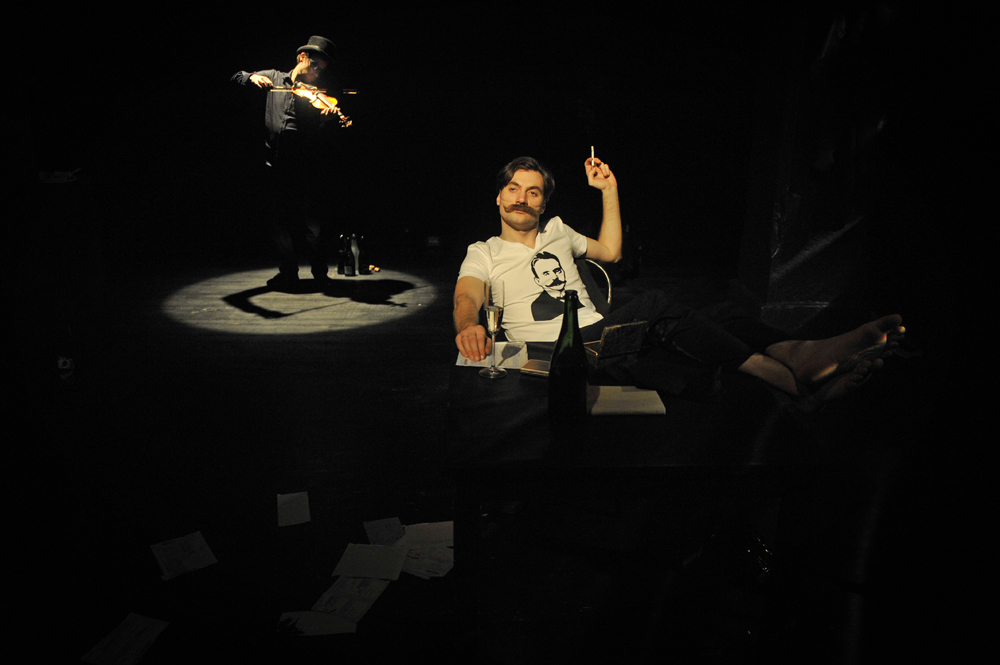 Freedom based on Ivan Cankar's essay White Chrysanthemum, conceived and performed by Branko Jordan and Miha Golob. Produced by Glej Theatre, 2014.
Freedom based on Ivan Cankar's essay White Chrysanthemum, conceived and performed by Branko Jordan and Miha Golob. Produced by Glej Theatre, 2014.
Following its policy to promote new ideas, approaches, and aesthetics, Glej Theatre annually produces or co-produces over a dozen performances of different genres, ranging from classical dramatic stagings to physical theatre and even dance works.
Since 2007 Glej has opened its program structure in the form of the year round open call (for theatrical and multidisciplinary projects) to anyone who wishes to work in the theatre. This gives Glej the flexibility to swiftly respond to any potential changes and needs in the theatre environment.
Glej runs several programs which consist of innovative, engaged, and proactive concepts:
- Glej, Debut - offering young authors the opportunity to present their first project;
- Glej, Miniatures – a platform for short experimental theatre pieces, regardless of whether they are completed works or works in progress;
- Glej, Across the Border – guest performances of foreign small venues and production houses;
- Glej in English - performances that are performed in English or have English subtitles, aimed at foreign citizens living in Slovenia;
- Glej, Resident – a unique residency program offering an up coming artists the opportunity to research, develop and produce their own poetics over a period of one year.
Collaboration
Glej Theatre also forms bonds and connections with other institutions, regardless of whether they are independent or state funded. Since 2012 Glej Theatre co-organizes Overflight International Theatre Festival with Mladinsko Theatre, coordinates Transferzala, the first season ticket that covers five independent Ljubljana theatres (Mini Theatre, Dance Theatre Ljubljana, Španski borci Culture Centre, Stara Elektrarna - Old Power Station and Glej Theatre). Glej also often helps various festivals and independent artists by offering its venue for their performances.
Educational platform
Glej differs from other theatres in Slovenia by its unique way to identify and address challenges in the performing arts community in Slovenia. Glej initiated several educational platforms which have been widely recognized as original, fresh and innovative (PreGlej na glas! Playwriting Festival, a program for the promotion and development of quality Slovene playwriting; TOP Program for the development of young theatre critics; workshops for light designers; Poslušaj, a program for the development of theatre music).
Regardless of its various programmes and numerous cooperation’s Glej remains dedicated to young artists who often take their first steps in the theatre between the four pillars in Glej.
International cooperation
Glej Theater has been actively involved in several international projects and platforms, e.g. Development of New Art (DNA) (an EU supported project 2011-2013 led by the Czech NOVA SIT Association, with partners from Denmark, Hungary, Germany, Lithuania, Poland, Slovakia and Slovenia) and the European Theater Night (2011, 2012). Currently, it is a member of the International Network for Contemporary Performing Arts (IETM), East European Performing Arts Platform (EEPAP) and a Call to Create platform.
In 2014 Glej initiated a Generation 2 Generation project together with partners from the Netherlands, Belgium, Bosnia and Herzegovina and France, which focuses on the development of the theatre for teenage audience and the audience development in general.
External links
Gallery
 Freedom based on Ivan Cankar's essay White Chrysanthemum, conceived and performed by Branko Jordan and Miha Golob. +
Freedom based on Ivan Cankar's essay White Chrysanthemum, conceived and performed by Branko Jordan and Miha Golob. +



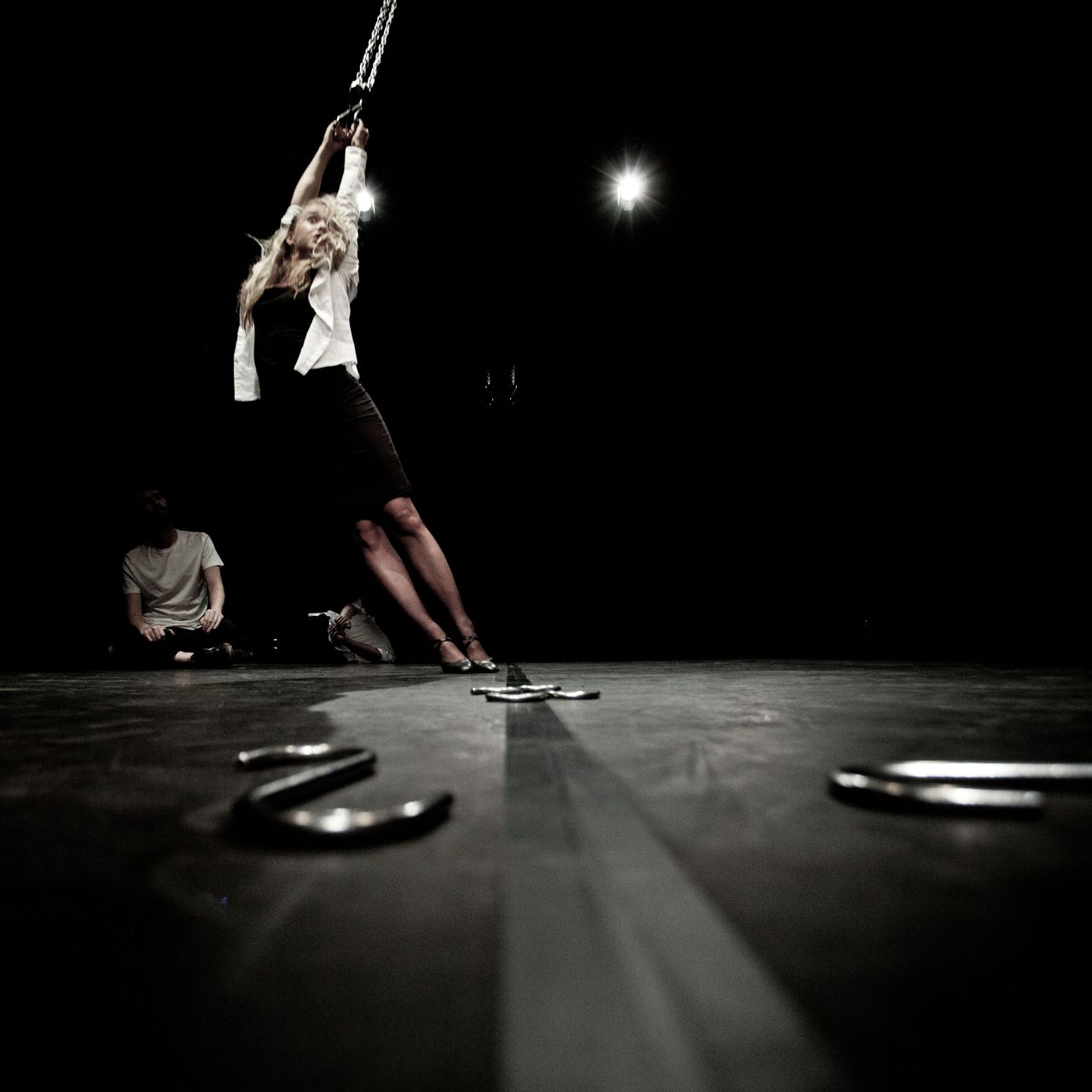
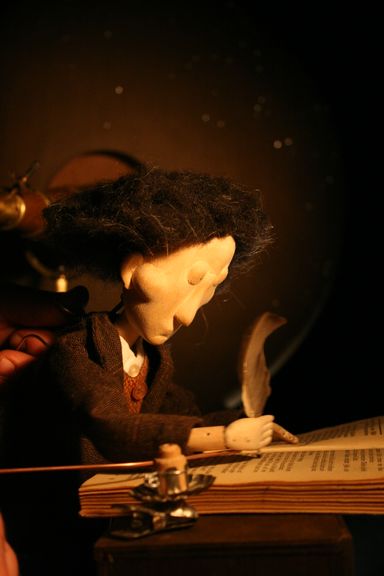
![Press image for Šajning [Shining], directed by Borut Bučinel, premiere in Glej Theatre, 2010](/images/thumb/7/7f/Glej_Theatre_2009_Shining_Photo_Urska_Boljkovac.jpg/576px-Glej_Theatre_2009_Shining_Photo_Urska_Boljkovac.jpg)
